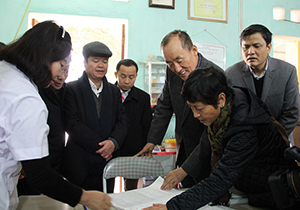WHO welcomes the launch of a three-months training course for commune health workers in Viet Nam. The training course for doctors teaches new skills to detect and treat noncommunicable diseases such as diabetes, hypertension at the commune level and introduces principles of family medicine.
The launch of the training course is part of efforts of the Ministry of Health to improve capacity of commune health workers and quality of care provided at the grassroots level.
“To meet the populations’ changing health needs, Viet Nam is investing in its doctors and nurses. Recent efforts have focused on providing competency-based trainings for doctors and nurses, as well as upgrading general doctors to family doctors to give them more responsibility to provide more and better quality services close to people’s homes,” said Professor Dr Pham Le Tuan, Vice-Minister of Health of Viet Nam, speaking at the launch in Hoa Binh province.
While progress to provide affordable, quality health care to every person, everywhere is strong, regional and ethnic disparities remain. Families in remote, and often mountainous areas, still struggle to access basic health services. Drugs to treat noncommunicable diseases are not always available or of good quality. Consequently, patients lack confidence in the quality of services provided close to their homes, often choosing to seek care at far-away hospitals. This usually results in substantially higher costs and inconvenience.
The focus of the training course on noncommuicable diseases helps to tackle the heavy burden of such diseases in Viet Nam. Noncommunicable diseases are estimated to account for 73% of Viet Nam’s total disease burden. Effectively management of noncommunicable diseases requires re-orientation of the model of care which ensures care to patients is well coordinated across levels of care, of good quality, continual and close to where patients reside. These measures improve the quality of care, reduce health care spending and ultimately improve the health and well-being of families across Viet Nam.

"NCD and ageing population require new service delivery model. A strong primary health care network with family medicines approaches can help to provide that type of care. Training for commune health workers on noncommunicable diseases management and family medicine approaches is the first step toward improving and strengthening the grassroots health care system", said Dr Kidong Park, WHO Representative in Viet Nam.
The launch of the training course for commune health workers is a clear demonstration of Viet Nam’s commitment to attain Universal Health Coverage. Viet Nam also reaffirmed its commitment to UHC at the global stage, during the UHC Forum in Tokyo in December 2017.
WHO, together with key development partners, adopted during the Forum the Tokyo Declaration to accelerate progress towards UHC, and to achieving health for all people, whoever they are, wherever they live, by 2030.
In addition, to accelerate progress toward UHC in Viet Nam a new initiative, The Tokyo Joint UHC Initiative, supported by the government of Japan and led by the World Bank, in collaboration with the Japan International Cooperation Agency (JICA), UNICEF, and WHO was also launched. The initiative will support Viet Nam to make health financing more efficient, and strengthen amongst other preparedness for pandemic emergencies.
